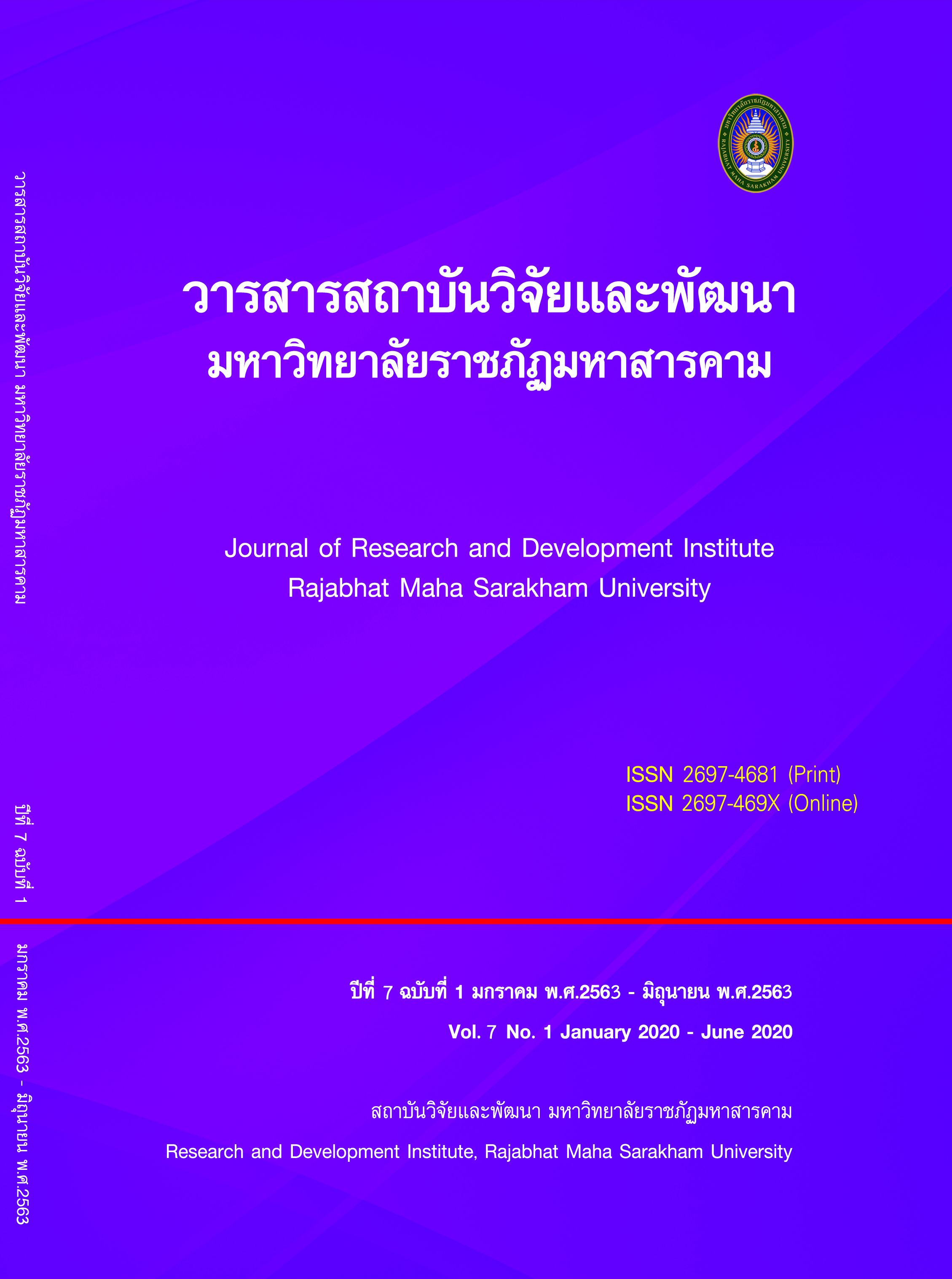The Development of the Model of School Administrative Effectiveness on School-based Management for Schools under the Secondary Education Office Area 25
Keywords:
Model Development, School-based ManagementAbstract
The purposes of this research were to 1) study the components of the model of the school administrative effectiveness on the school-based management 2) develop the model of the school administrative effectiveness on the school-based management and 3) evaluate the model of the school administrative effectiveness on the school-based management for schools under the secondary education office service area 25. The research procedures were divided into three phrases. The first stage was to study the components of the model of the school administrative effectiveness on the school-based management by synthetic the data, in-depth interview from 9 professionals and 119 samples. The second stage was the development the model of the school administrative effectiveness on the school-based management by using the focus group and connoisseurship. And the third stage of the research was the evaluation the model of the school administrative effectiveness on the school-based management for schools under the secondary education office service area 25 with 1 school and 24 co-researchers.
The results found that: 1) The components of the model of the school administrative effectiveness on the school-based management for schools under the secondary education office service area 25 were decentralization, participation administration, learners’ characteristic and achievement and learning organization. 2) The development of the model in the accuracy, the possibility and the profitability were high in overall. and 3) The result of evaluation of the model from the experiment according to, the form, the quality of the operation by the indicators and the satisfaction of the participants was high in every aspect.
References
References
Boonchom Srisa-ard. (2010). Introduction of Research. (8thed). Bangkok: Suviriyasarn.
Caldwell, B.J., and Spinks J.M. (1990). The Self-Managing School. London: Taylor and Francis (Printers) Ltd.
Cheng, Yin Cheong. (1996). School Effectiveness and School-Based Management: A Mechanism for Development. Washington: The Flamer Press.
Gamage, D. (2003). School-based management leads to shared responsibility and quality in education. Australia: The University of Newcastle.
Hoy, W. K. and Miskel, C.G. (2001). Educational administration: Theory, Research, and Practice. (6thed). Singapore: McGraw-Hill.
McCauley, C.D., & others. (1998). The Center for Creative Leadership: Handbook of Leadership Development. San Francisco : Jossey – Bass.
Ministry of Education. (2008). The Basic Education Core Curriculum B.E. 2551 (A.D. 2008). Bangkok: Office of the Permanent Secretary, Ministry of Education.
Ministry of Education. (2010) The Ministry of Education 2010 Annual Report. Bangkok: Office of the Permanent Secretary, Ministry of Education.
Office of the Education Council. (2004). Strategic Recommendations for Education Reform. Bangkok: Century Co. Ltd.
Pinsuda Siridhrungsri. (2014). Upgrading Thai Teachers in 21st Century. Documentation Conference 6 - 8 May 2014.
Pruchya Sawarut. (2004). Thai education reform. Bangkok: Office of Educational Reform.
Rung Kaewdang. (2003). School as Juristic Person. Bangkok : Thai Wattana-panich.
Somchai Thepsang. (2009). Modern Management: The Key to Excellence. Bangkok: Promotion Center academic.
Sontaya Polsri. (2004). Theories and principles for community development. 5 edition. Bangkok: Odien Store.
Stoner, A.F., & Wankel, C. (1986). Management. 3rd ed. New Delhi: Prentice – Hill.
Sumrit Kangpheng. (2008). Administrative Factors Affecting School Effectiveness: Model Development and Validation. Doctor of Education Thesis in Educational Administration, Graduate School, KhonKaen University.
Teera Runcharoen. (2010). Administration for Learning Reform. Bangkok: Khaofang: Publishing.
Uthai Boonprasert. (2000). The Study of Administrative and Educational Management using School-Based Management. Bangkok: Kurusapha Ladprao Publisher.
Werayut Chatakan. (2011). Management Techniques for Professional Education Administrators. Bangkok: Vprint.
Wohlstetter, P. (1995). “Getting School-based Management Right: What Works and What Doesn’t”. Phi Delta Kappan, 77 (1), 22-25.
Downloads
Published
How to Cite
Issue
Section
License
Articles that are published are copyrighted by the authors of the articles







